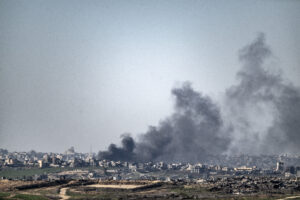Starvation looms as 1M people displaced by Myanmar violence: UN
GENEVA (AA) – Widespread fear and insecurity among Myanmar’s civilian population has forced over 1 million people from their homes, a top UN official has said, warning of rising fears of starvation in the country.
More than 1 million people have been displaced, including 45,500 who have moved to neighboring countries, and “now live in precarious conditions without access to food, medical assistance, and other basic services,” Nada Al-Nashif, UN acting high commissioner for human rights, told the UN Human Rights Council.
ASEAN nations must ramp up efforts for humanitarian support and “promote a resolution to the crisis, in consultation with the people’s representatives, and with support backing from regional powers,” she said.
“The humanitarian crisis now brings fears of starvation, with the military largely denying humanitarian access, including recent orders to halt humanitarian operations in northern and central Rakhine State,” Al-Nashif said.
Rakhine is the region where the Myanmar military- now running the government- carried out a brutal crackdown against the Rohingya Muslim community in 2017. Thousands were butchered and burnt, while millions fled for their lives. Rohingya refugees still live in misery in impoverished refugee camps in Bangladesh and elsewhere.
She said at least 2,316 people, including at least 188 children, have been killed in Myanmar since the military seized power in the February 2021 coup.
“Over 15,607 people have been arrested with some 12,464 remaining in detention. The death toll of people in custody is steadily rising. At least 273 persons have died in formal detention settings,” she said.
There have also been at least 266 deaths during raids and arrests in villages, at least 40 of whom were reportedly killed with headshots, the official added.
“There are 111 reported cases of people being burned, either alive or after being executed, in what appears to be a tactic of summary executions and attempts to destroy evidence of crimes,” Al-Nashif said.
She said the military executed four people, including a former member of parliament and a democracy activist, following a secretive military court trial, in violation of fair trial standards and the rule of law principles.
“These executions, which are the first in about 30 years, represent an important indicator of the regression of human rights in Myanmar and the military’s complete disregard for international law,” she said.
“I reiterate calls to the military to cease violence, including by imposing a moratorium on executions, free all political prisoners, ensure access to humanitarian aid and return Myanmar to democracy based on respect for human rights and the rule of law.”
The UN rights office has also documented that the military arrested and charged at least 10 lawyers defending people charged with spurious, politically motivated offenses, the official said.
With the precarious human rights situation in the country, the repatriation of Rohingya refugees seems an impossibility, exacerbating their endless suffering.










